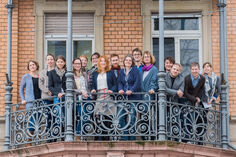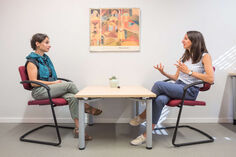Internet-based aftercare for personality and post-traumatic stress disorder
Contact: PD Dr. Stephanie Bauer (stephanie.bauer(at)med.uni-heidelberg.de)
Project period: 2015-2017
Project description
Personality and trauma sequelae disorders require long-term, if not lifelong, therapeutic care. Frequently, several inpatient hospital admissions are required to adequately prepare affected individuals for subsequent outpatient treatment. The interval between inpatient admissions as well as the waiting time after discharge until the start of the subsequent outpatient treatment bear a high risk of loss of learned skills and a repeated exacerbation of the patient's condition. To counteract this, the FOST developed an internet-based aftercare program for patients with personality and post-traumatic disorders in cooperation with the SRH Klinikum Karlsbad-Langensteinbach and the Clienia Littenheid AG in Switzerland.
The main goal of the project is to support participating patients in the period after their inpatient therapy until the start of follow-up treatment in order to practice and maintain acquired skills, to strengthen the individual disease management of the patients, and to prevent relapses into pathological behavior patterns.
The intervention is comprised of the following modules:
- Weekly schedule: Participants structure their week through personal schedule entries and document the use and benefits of skills (such as mindfulness exercises).
- Informationen: Participants are taught disease- and therapy-related knowledge and receive instructions on how to perform relaxation and imagination exercises, as well as how to support active disease management
- Monitoring: Participants answer a short weekly questionnaire about suicidal thoughts, self-harm urges and behaviors, negative and positive feelings (distress/ distress and joy), and their sleep patterns.
- Individual emergency kit: This includes individually effective skills and coping strategies for participants prior to discharge from the clinic.
- Goal setting: In this module, higher-level (i.e., larger) tasks and/or resolutions are deposited for participants for the time after their hospital stay (such as finding housing, contacting family).
- Chat: Therapeutically guided group chats are provided on a weekly basis. The focus lies on the participants' exchange about everyday activities, maintaining and activating resources, using skills and conflict management strategies, as well as maintaining the weekly structure.
Currently, the aftercare program is being studied in a pilot phase with regard to the target group's willingness to participate, its potential benefits for the participating patients, and their satisfaction with the program. A multicenter efficacy study is to be prepared on the basis of the findings obtained in the pilot phase.
Literature
Bilic, S., Moessner, M., Wirtz, G., Lang, S., Weisbrod, M., & Bauer, S. (2020). Internet-based aftercare for patients with personality disorders and trauma-related disorders: A pilot study. Psychiatry Research, 285, 112771.
Cooperation partners
SRH Klinikum Karlsbad-Langensteinbach GmbH
Abteilung Psychiatrie und Psychotherapie
76307 Karlsbad
Medical Director: Prof. Dr. med. Matthias Weisbrodt
Homepage
Clienia Littenheid AG
Privatklinik für Psychiatrie und Psychotherapie
CH-9573 Littenheid
Medical Director: Prof. Dr. med. Silke Bachmann
Homepage
Further Information
Project Homepage: www.psyres.de/stayintouch



